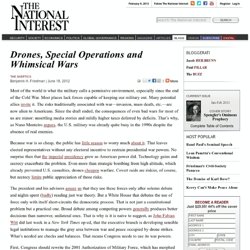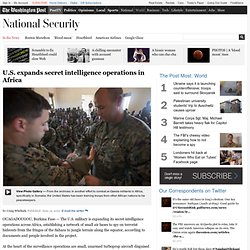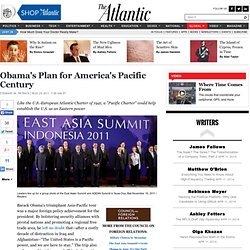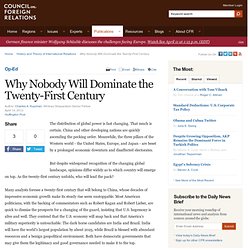

The Global Power Shift from West to East. WHEN GREAT powers begin to experience erosion in their global standing, their leaders inevitably strike a pose of denial. At the dawn of the twentieth century, as British leaders dimly discerned such an erosion in their country’s global dominance, the great diplomat Lord Salisbury issued a gloomy rumination that captured at once both the inevitability of decline and the denial of it. “Whatever happens will be for the worse,” he declared.
“Therefore it is our interest that as little should happen as possible.” Of course, one element of decline was the country’s diminishing ability to influence how much or how little actually happened. Drones, Special Operations and Whimsical Wars. Most of the world is what the military calls a permissive environment, especially since the end of the Cold War.

Most places lack forces capable of keeping our military out. Many potential allies invite it. The risks traditionally associated with war—invasion, mass death, etc. —are now alien to Americans. Since the draft ended, the consequences of even bad wars for most of us are minor: unsettling media stories and mildly higher taxes deferred by deficits. Because war is so cheap, the public has little reason to worry much about it . The president and his advisors assure us that they use these forces only after solemn debate and nights spent ( badly ) reading just war theory.
First, Congress should rewrite the 2001 Authorization of Military Force, which has morphed into a legal rationale for doing whatever presidents want in the name of counterterrorism. The trouble, as already noted, is that Congress has no interest in doing these things. U.S. expands secret intelligence operations in Africa. About a dozen air bases have been established in Africa since 2007, according to a former senior U.S. commander involved in setting up the network.

Most are small operations run out of secluded hangars at African military bases or civilian airports. The nature and extent of the missions, as well as many of the bases being used, have not been previously reported but are partially documented in public Defense Department contracts. The operations have intensified in recent months, part of a growing shadow war against al-Qaeda affiliates and other militant groups. The surveillance is overseen by U.S. Special Operations forces but relies heavily on private military contractors and support from African troops.
The surveillance underscores how Special Operations forces, which have played an outsize role in the Obama administration’s national security strategy, are working clandestinely all over the globe, not just in war zones. A hub for secret network. The State of the World: A Framework. The End of Counterinsurgency and the Scalable Force.
Budget Issues. Obama's Plan for America's Pacific Century - Stewart M. Patrick - International. Like the U.S.

-European Atlantic Charter of 1941, a "Pacific Charter" could help establish the U.S. as an Eastern power Leaders line up for a group photo at the East Asian Summit and ASEAN Summit in Nusa Dua, Bali November 19, 2011 / Reuters Barack Obama's triumphant Asia-Pacific tour was a major foreign policy achievement for the president. By bolstering security alliances with pivotal nations and promoting a regional free trade area, he left no doubt that--after a costly decade of distraction in Iraq and Afghanistan--"The United States is a Pacific power, and we are here to stay. " The trip also underscored just how much China's dramatic rise has unsettled its neighbors, both in the realms of economics and security. The Global Power Shift from West to East.
WHEN GREAT powers begin to experience erosion in their global standing, their leaders inevitably strike a pose of denial. At the dawn of the twentieth century, as British leaders dimly discerned such an erosion in their country’s global dominance, the great diplomat Lord Salisbury issued a gloomy rumination that captured at once both the inevitability of decline and the denial of it. “Whatever happens will be for the worse,” he declared. “Therefore it is our interest that as little should happen as possible.” Of course, one element of decline was the country’s diminishing ability to influence how much or how little actually happened. We are seeing a similar phenomenon today in America, where the topic of decline stirs discomfort in national leaders.
2012.04.18-Geostrategic-Return-Philippines1. America's Pacific Century - By Hillary Clinton. As the war in Iraq winds down and America begins to withdraw its forces from Afghanistan, the United States stands at a pivot point.

Over the last 10 years, we have allocated immense resources to those two theaters. In the next 10 years, we need to be smart and systematic about where we invest time and energy, so that we put ourselves in the best position to sustain our leadership, secure our interests, and advance our values. One of the most important tasks of American statecraft over the next decade will therefore be to lock in a substantially increased investment -- diplomatic, economic, strategic, and otherwise -- in the Asia-Pacific region.
Why Nobody Will Dominate the Twenty-First Century. The distribution of global power is fast changing.

That much is certain. China and other developing nations are quickly ascending the pecking order. Meanwhile, the three pillars of the Western world - the United States, Europe, and Japan - are beset by a prolonged economic downturn and disaffected electorates. But despite widespread recognition of the changing global landscape, opinions differ widely as to which country will emerge on top. 2008.11.17-US-Marine-Corps. 2009.02.17-The-US-Navy-Charting-a-Course-for-Tomorrows-Fleet. 2009.09.01-Regaining-Strategic-Competence. 2010.01.11-Defense-Planning-for-the-Long-Haul. 2010.10.21-Understanding-Americas-Contested-Supremacy. 2010.02.19-Why-AirSea-Battle. 2010.05.18-AirSea-Battle. Keeping a Lid on East Asia.